The Secret of Not Getting Bit By a Hormonal, Territorial but Very Cute Female Lovie
* If your lovebird's bites do hurt the first thing you need to do is check that beak. It might simply just need grooming. It's the difference between a a person with sharp fingernails and well-groomed rounded ones. Lovebirds that need grooming will have little points on the side of their beaks that look like little vampire teeth. So sometimes, your little girl might not mean to bite you hard, it's just her beak is way too sharp.
* Establish a basic routine so surprises can be minimal. Even monthly adventures out of the home or trips to the vet become part of the routine. Routine also teaches a bird confidence. A girl with no confidence will bite quicker than a bird that is secure with her place within the flock; even if it’s just the two of you.
* Teaching tricks, having jobs, and clicker training will keep her mind sharp and she will view you as the flock leader. Birds who know tricks live to please their owners and their rewards.
* Make her forage for her food, giving her a job other than breeding.
* People feed their birds way too much. Giving a bird enough food for all day long is not natural. Birds in the wild: wake-up, fly to the feeding grounds, let their crops empty, and then fly to find more food. My birds have the same routine. They wake-up, play, then fly to their cages to eat breakfast, morning nap, play, afternoon nap, play, eat supper, short evening nap, play, go to bed at 7:30. Birds need a reason to want to go back into their cages either for food, private play, or rest.
* I am at the top of the pecking order, and my birds know it. Be bold and handle them with confidence and with rules. Our babies such as Luna, Sapphire, Mango, Starburst, and Skittles are very bold birds who can run their entire household if given a chance. When we baby sat them, they quickly learned that they can not act like they do at home. When their owners return after vacation, we show them tricks on how not to let your lovebird run your household. For example: they feed the bird way too much thus not having her to look forward to going back into her cage (I never have to chase a bird around the house to get them back into the cage), if you are holding two birds in or on your hands, hold the one you trust more at a higher level than the other. Teach the bird you are not a human playground, and you are not here to tend to their every little need and want. Not letting the bird do what they want all the time, and making them stay on your hand if that’s what you expect.
* I don’t expect to get bitten. The thought never enters my mind. You have already failed even before you have started if you think about bites. Birds can read your body language and it seems as though they can read your thoughts. My middle school music students can play compositions at a high school, lower college level because I have taught them confidence. BTW my students who have birds have never been bitten by their birds either. My birds know the “up” command, and I see nothing wrong with it. It is not forcing a bird when the bird wants to come to you anyways. With smaller birds I let them in the palms of my hands. I have seen the boldest lovebirds return to little babies by using this simple technique.
* Don’t give her the opportunity to bite, ever. In my humble experiences, biting for the most part is a learned response. The more a bird gets to bite, the more she gets to practice, and the more a bird practices the more comfortable they feel using biting to their advantage. If they bite in the cage, let them come out, if they can not be trusted in your clothes or shoulders, don’t let them in there. It’s that easy. Sierra loves to go in my clothes, but I do not let her. Also, Sierra does not use her beak anymore and has completely forgotten how to bite humans.
* Birds should have rules. I might clean their poop all day, but I am not their human slave. Only have them stay on the hand if that’s the only place you can trust them. If they bite your hand, let them only stay on your arm. Our breeders use to be scared of hands, so I had them step-up on my arm while I hid my fingers and thumb by making a soft fist. If they go anywhere else, place them back on their cage or a playground without saying a word. If she is on your hand/ arm and tries to move up, place your other hand like a high five right in front of her. This has stopped my birds in their tracts. If she tries to bite your high five hand, it is ok for you to move your hand slightly that she is standing on to distract her from trying to bite. If she knows tricks, then distract her with one of her tricks. If she continues to not follow the rules, place her on her cage or a playground without saying a word.
* Sometimes you just need to let a bird be a bird. Why does the bird have to be on you for them to be happy? Just let them play on or in their cage, or a playground, look for food, or simply interact with other birds. I very rarely go up to my birds and have them step-up on me. They play and when they want me, they fly to me. When they are finished interacting with me, they fly back into the bird room. When I actually have them step-up, they see it as Christmas and are more willing.
* Playgrounds are not an option. If she has a reason to come out of her cage, then she might have a reason to interact with you also. Also, if she is in breeding mode, let her out of that cage. Get her mind off nesting and out of the nest box, her cage.
* Let other birds teach her how to be a part of the flock. The other birds will teach her how to act around people also. Females tend to be on their best behaviors when they are not alone while on the human.
* Everything should be positive including you coming to the cage, them going back into the cage, them being on you, them being off you.
* People talk too much to their birds and get them way too excited. I have seen my lovebirds have a complete conversation from body language alone. I am actually very quiet around my flock, but when I do say something they listen closer to what I have to say. I have seen too many people talk too much baby talk to their birds and it gets them way to excited to the point where they can not even control themselves. It’s like making a child hyper because they feed off your energy. Also, your female might think you are courting her with all that “singing.”
* Withhold their favorite treat for only special occasions such as trick training, going back to the cage, or checking the nest box. When we check for babies we have conditioned our pairs to see our presence in a positive light. We gently tap the top of the nest box which is their cue to step-out and go to their food bowls. We place seed or millet in their bowls, place a napkin in the nest box's hole, and continue to check their babies. After we remove the napkin, the parents return with a full crop to feed their baby some much needed energy and fat stored in the seeds.
* Clicker training: First click and then give her a treat showing her that the clicker is a promise for reward. Once she understands this, you can move forth to basic and then advanced training. If the female is not interested in stepping-up readily, lure her with her favorite treat and make her lean for it forcing her to walk on your hand. When she does something you like, "Click and Treat." It's like playing a game of hot and cold. If she is hot, click and treat, if she is cold do nothing. Here is a video of Piper and Bailey, Trinkets grandparents!
* Be careful you are not pushing her to do too much. Open beak stance, with possible swaying, is not a good thing. She probably feels threaten and unsure with your presence. Put her in a place in the home where she can see the family activities and get used to your presence. Do not sneak up on her or surprise her accidentally frightening her. Hold her in the palm of your hand if possible. Your palm is warm and soothing to birds, plus they feel that they are back in the nest.
* Concerning cage placement, shy and nervous birds benefit with having one or two sides of the cage being next to a wall. The best thing we ever did for Cody and Mia was placing their cage near the corner of the bird room. Their confidence has grown to new levels since then and they interact with us more.
* Never ask her to step-up with just one finger. You might as well be pointing rudely to her just like if you were pointing at a person. Either use the open palm technique or ask her to step-up while your hand is in a horizontal 4 pattern parallel to her body. When she first starts her baby molt, she will most likely start rubbing her head gently on your fingers. Then you can start by preening her head with the fingers on the hand that she is standing on. This is how you teach small birds to enjoy being preened. If she allows touching already, place your chin on her back. Even with my adult birds, when they are in the palm of my hand I will place my chin on their back then kiss their little heads. This is a very soothing motion to babies because this is what Mommy bird does with her beak in the nest to soothe her little ones.
* Between three and four months your lovebird will go through a beaking phase. It is very much like a teething stage in infants, but it doesn’t hurt. This stage has its pros and cons. It is a great time to introduce new foods and toys, but baby will also start to beak your fingers. Never let him have the chance to develop this habit or he will carry it out for the rest of his life. As soon as he starts to beak your fingers, place a chewable toy such as Bird Candy or Chinese Finger Traps in his mouth. He is looking for negative attention. Simply ignore him with no reaction, calmly say no, and give him something to demolish. You have to explain this to other people visiting your bird also; even if they say they don’t mind the nibbling. The nibbles will turn to bites after six months of age if you don’t intervene then. Lovebirds are as smart as a two year-old child; they will test you. With some discipline and consistency from your part, your baby will pass this testing stage in less than a month.
* It's alright to get females mates. A tame male will teach the female how to be tame also. She will follow his lead.
* Females are not being mean; they are trying to be great mothers. Once we understand that, we will be able to live a more peaceful coherence together. Know when she will bite, and stay 2 steps ahead of her not letting her “practice” biting.


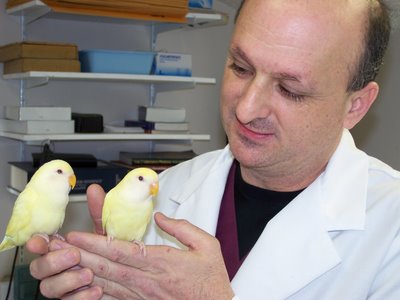

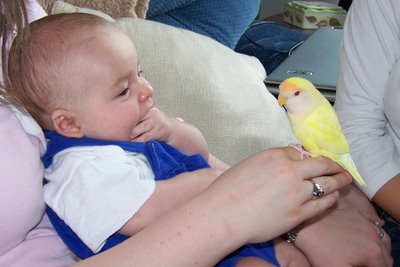



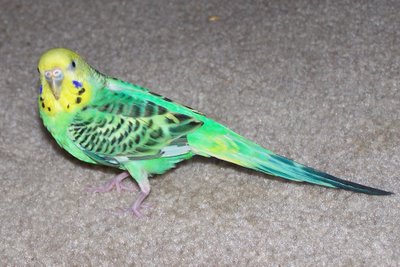

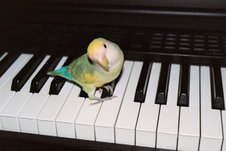
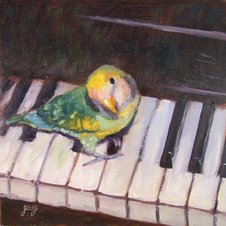
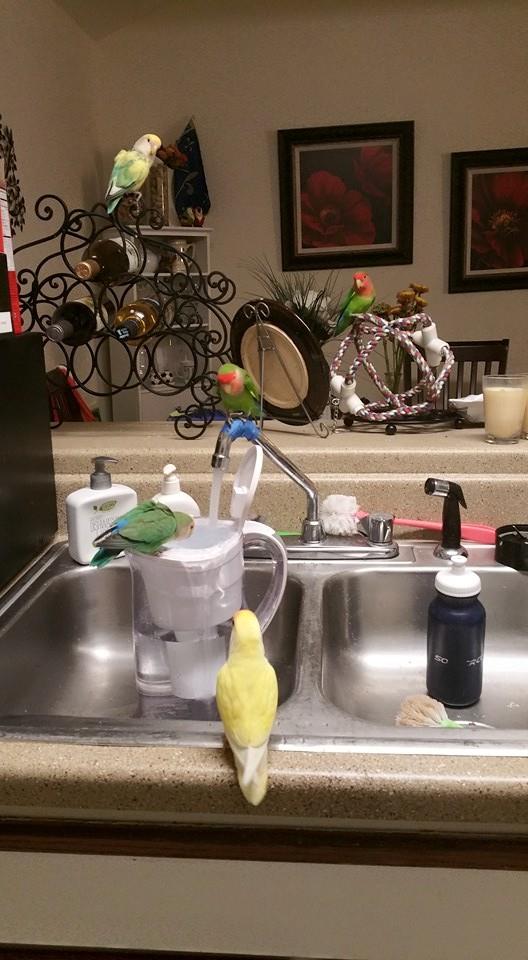














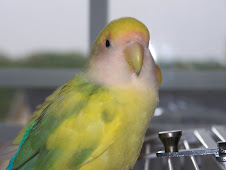

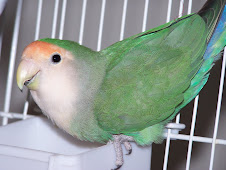



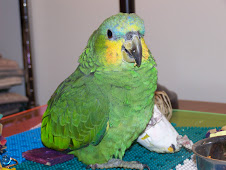
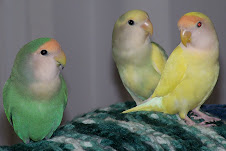


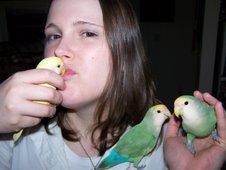
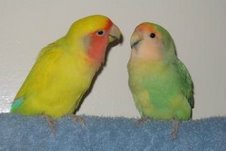
.jpg)
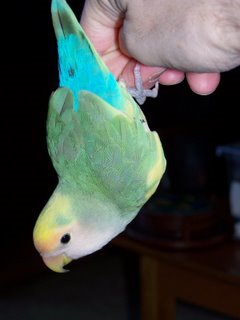
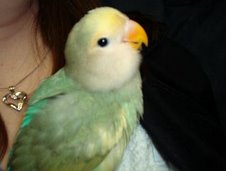
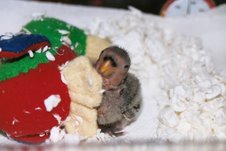
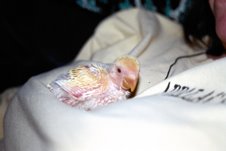



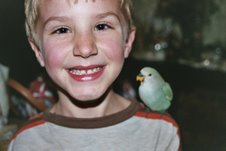
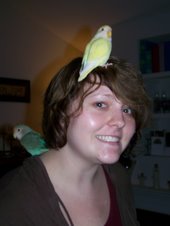




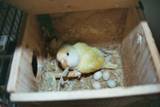
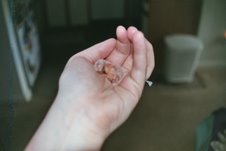

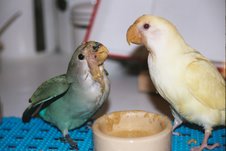
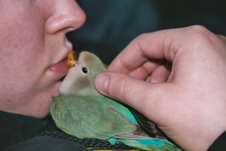
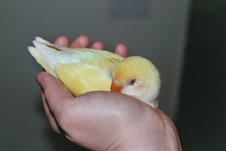
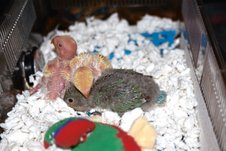
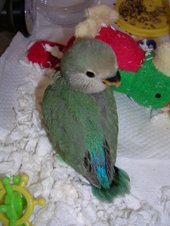
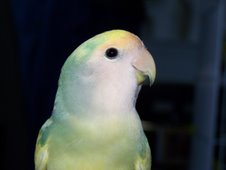
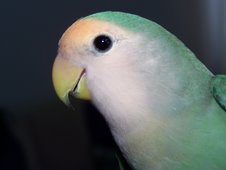
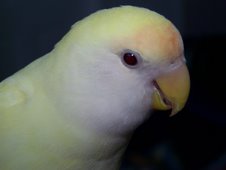
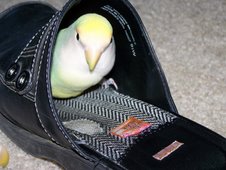
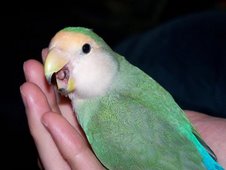
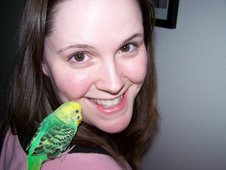


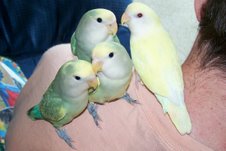



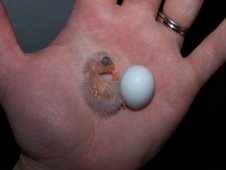
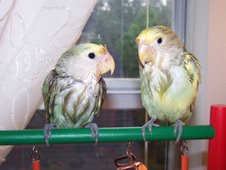



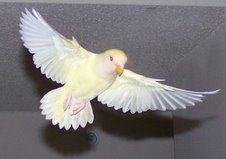

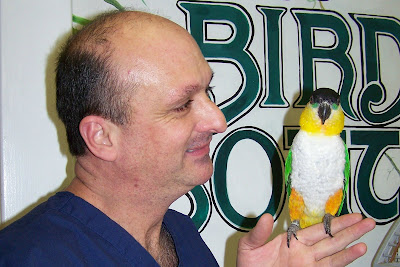







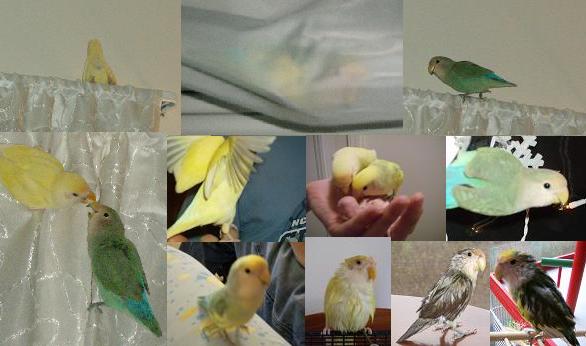
No comments:
Post a Comment